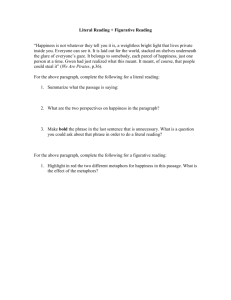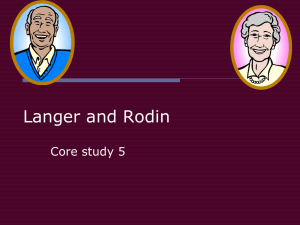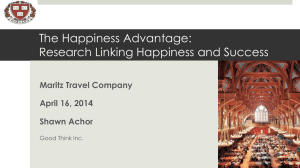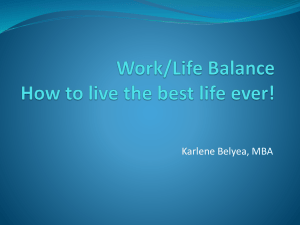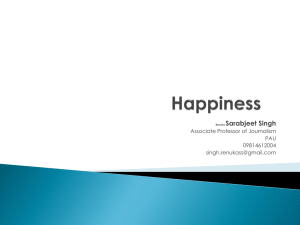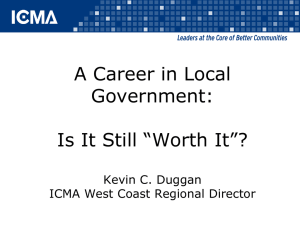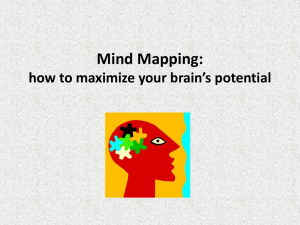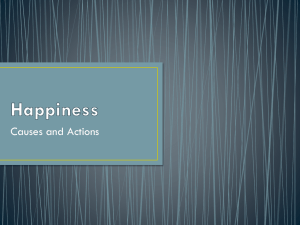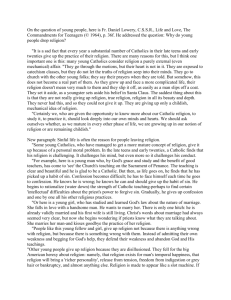Reading and Writing
advertisement
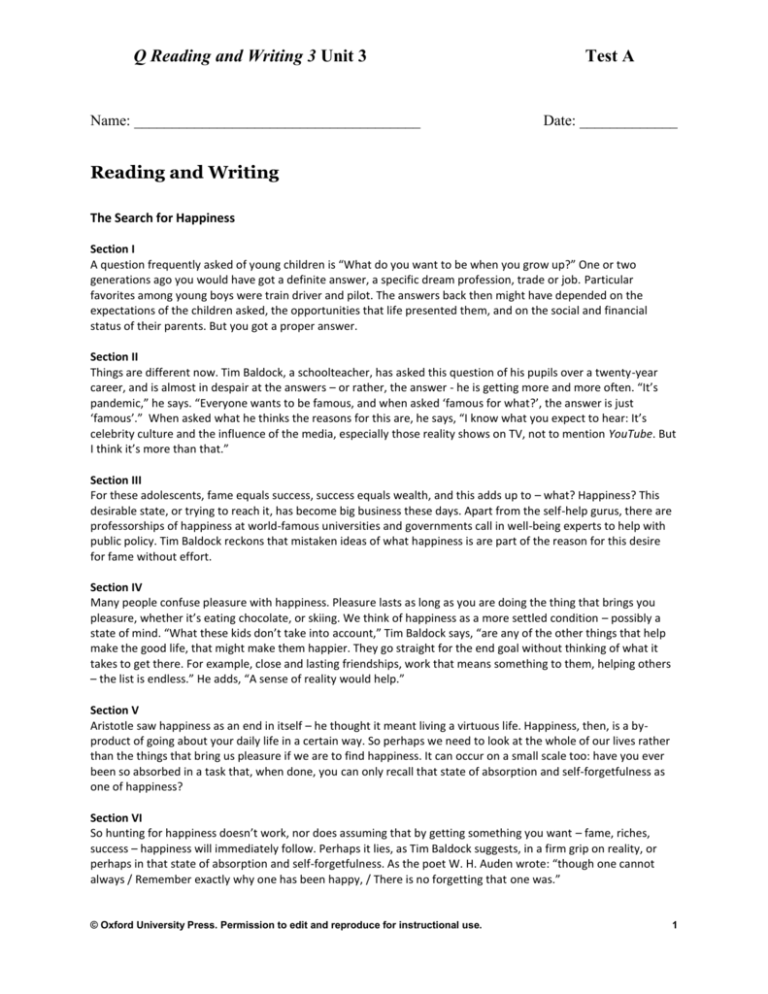
Q Reading and Writing 3 Unit 3 Name: ______________________________________ Test A Date: _____________ Reading and Writing The Search for Happiness Section I A question frequently asked of young children is “What do you want to be when you grow up?” One or two generations ago you would have got a definite answer, a specific dream profession, trade or job. Particular favorites among young boys were train driver and pilot. The answers back then might have depended on the expectations of the children asked, the opportunities that life presented them, and on the social and financial status of their parents. But you got a proper answer. Section II Things are different now. Tim Baldock, a schoolteacher, has asked this question of his pupils over a twenty-year career, and is almost in despair at the answers – or rather, the answer - he is getting more and more often. “It’s pandemic,” he says. “Everyone wants to be famous, and when asked ‘famous for what?’, the answer is just ‘famous’.” When asked what he thinks the reasons for this are, he says, “I know what you expect to hear: It’s celebrity culture and the influence of the media, especially those reality shows on TV, not to mention YouTube. But I think it’s more than that.” Section III For these adolescents, fame equals success, success equals wealth, and this adds up to – what? Happiness? This desirable state, or trying to reach it, has become big business these days. Apart from the self-help gurus, there are professorships of happiness at world-famous universities and governments call in well-being experts to help with public policy. Tim Baldock reckons that mistaken ideas of what happiness is are part of the reason for this desire for fame without effort. Section IV Many people confuse pleasure with happiness. Pleasure lasts as long as you are doing the thing that brings you pleasure, whether it’s eating chocolate, or skiing. We think of happiness as a more settled condition – possibly a state of mind. “What these kids don’t take into account,” Tim Baldock says, “are any of the other things that help make the good life, that might make them happier. They go straight for the end goal without thinking of what it takes to get there. For example, close and lasting friendships, work that means something to them, helping others – the list is endless.” He adds, “A sense of reality would help.” Section V Aristotle saw happiness as an end in itself – he thought it meant living a virtuous life. Happiness, then, is a byproduct of going about your daily life in a certain way. So perhaps we need to look at the whole of our lives rather than the things that bring us pleasure if we are to find happiness. It can occur on a small scale too: have you ever been so absorbed in a task that, when done, you can only recall that state of absorption and self-forgetfulness as one of happiness? Section VI So hunting for happiness doesn’t work, nor does assuming that by getting something you want – fame, riches, success – happiness will immediately follow. Perhaps it lies, as Tim Baldock suggests, in a firm grip on reality, or perhaps in that state of absorption and self-forgetfulness. As the poet W. H. Auden wrote: “though one cannot always / Remember exactly why one has been happy, / There is no forgetting that one was.” © Oxford University Press. Permission to edit and reproduce for instructional use. 1 Q Reading and Writing 3 Unit 3 Name: ______________________________________ Test A Date: _____________ Choose the best answer. 1. About thirty years ago young children A. were not obsessed with fame. B. knew exactly what they wanted to be. C. had an idea of what they wanted to be. D. had fewer expectations than children today. 2. Which of the following best describes Tim Baldock’s attitude to the situation? A. It makes him angry. B. He is saddened by it. C. He doesn’t understand it. D. It doesn’t concern him. 3. Tim Baldock’s students A. just want to be on TV. B. don’t want to make an effort. C. just want to be happy. D. think fame will make them happy. 4. Which of the following are not mentioned as part of the happiness business? A. politicians B. gurus C. professors D. experts 5. What do Tim Baldock’s students fail to realize? A. Happiness is a mental condition. B. Fame won’t bring them happiness. C. Happiness is not the same as pleasure. D. Achieving goals brings happiness. © Oxford University Press. Permission to edit and reproduce for instructional use. 2 Q Reading and Writing 3 Unit 3 Name: ______________________________________ 6. Test A Date: _____________ The author suggests that happiness A. can occur through concentration on work. B. comes from leading Aristotle’s virtuous life. C. only exists in one’s memory. D. comes when you get something you want. Match each sentence with the word that completes it. 7. It can be risky to _____ in a brand-new company. 8. Businesses are interested in the _____ of F1 racing into new countries. 9. Children are the biggest _____ for toy companies. 10. Bosses expect their employees to be responsible and _____. 11. The soccer team’s uniforms show the names of companies that _____ the team. 12. The racing team was _____ that it would receive money from the company. A. B. C. D. E. F. sponsor expansion dependable invest assured market Complete each sentence with the words from the word bank: upset about due to known for nervous about 13. The athlete’s hands were shaking because he was ____________________ playing his first game. 14. F1 racing is ____________________ being an expensive sport. 15. The coach looked ____________________ losing the championship game. 16. Her injury was ____________________ a skiing accident. Correct the error in subject-verb agreement. Rewrite each sentence correctly. 17. The football team practice every other day. _______________________________________________________________ 18. The coach does not likes players who quit. _______________________________________________________________ © Oxford University Press. Permission to edit and reproduce for instructional use. 3 Q Reading and Writing 3 Unit 3 Name: ______________________________________ Test A Date: _____________ 19. He and his son watches soccer on TV. _______________________________________________________________ 20. It do not look like she is going to win. _______________________________________________________________ Writing Do you think individual or group sports help children succeed in life? Write a paragraph that supports your opinion with reasons and examples. © Oxford University Press. Permission to edit and reproduce for instructional use. 4
